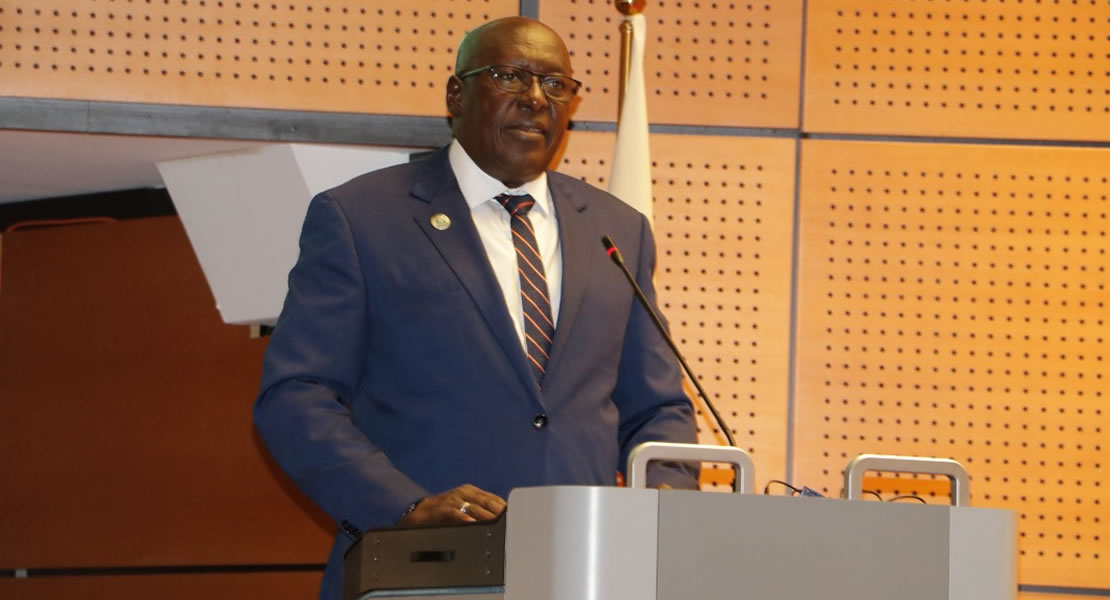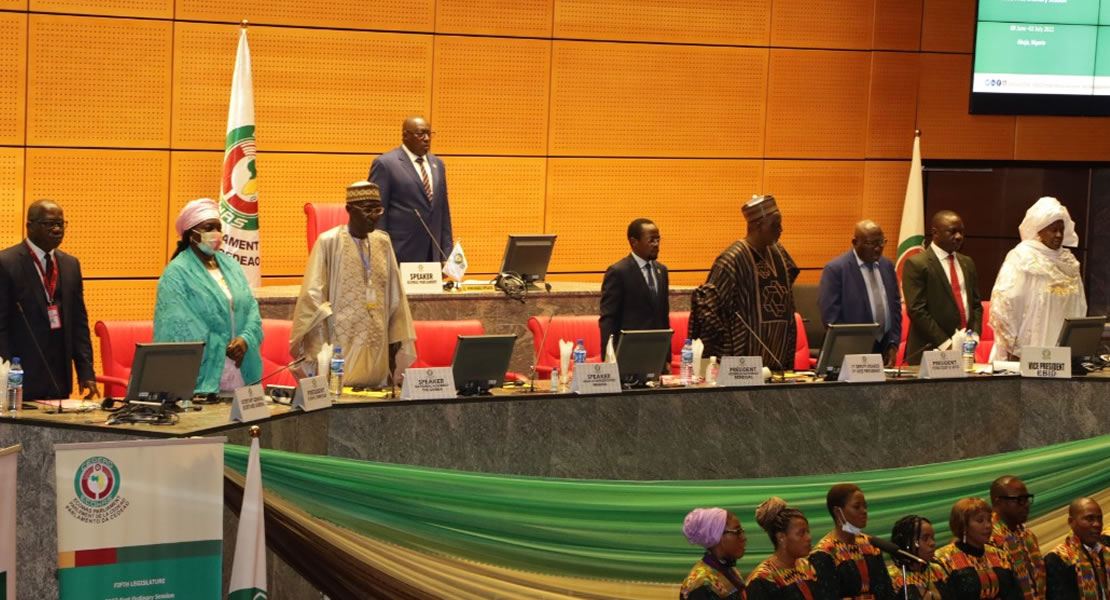
The Speaker of the ECOWAS Parliament, Rt. Hon. Dr. Sidie Mohamed Tunis has stressed that the exercise of the competence of Members of ECOWAS Parliament has become increasingly important, especially in the wake of the regional and global political and security situation.
He also highlighted that the COVID-19 Pandemic, coupled with the ongoing Russian military operation in Ukraine, have resulted in global economic slowdown, soaring food and energy cost and strain on government resources that are having far reaching consequences on the region and the world, stressing that the “the onus is, therefore, upon us to support policies that address these day-to-day issues”
The Speaker of the ECOWAS Parliament, Rt. Hon. Dr. Sidie Mohamed Tunis went philosophical while drawing attention to these challenges in his opening speech at the 2022 First Ordinary Session of the ECOWAS Parliament.
According to him, it has become evident that our people are much more concerned with the decisions we make and the ripple down effects they have on them. Each time he travels across the region, I am confronted with the hard questions: What is ECOWAS doing about food shortages? What is ECOWAS doing about rising prices of food and energy? What is ECOWAS doing about poverty eradication?
“These are the questions we must address. Not only with policy formulations and conferences, but with actionable solutions those are indisputable. As we do our work over the next few days, I pray we place much more emphasis on practical results. We cannot afford to fail our people”, he affirmed.
 The Rt. Honourable Speaker disclosed that in fulfillment of their responsibility, the session will be dedicated to the following: “a. Presentation by the President of the ECOWAS Commission on the Implementation of the Community Work Programme; b. Presentation of Country Reports by National Delegations; c. Consideration of a number of Referrals by the Plenary and the responsible standing Committees; d. Presentation to the plenary by some of our Partners on issues of relevance to the Community; e. Plenary Debates and other agenda items”.
The Rt. Honourable Speaker disclosed that in fulfillment of their responsibility, the session will be dedicated to the following: “a. Presentation by the President of the ECOWAS Commission on the Implementation of the Community Work Programme; b. Presentation of Country Reports by National Delegations; c. Consideration of a number of Referrals by the Plenary and the responsible standing Committees; d. Presentation to the plenary by some of our Partners on issues of relevance to the Community; e. Plenary Debates and other agenda items”.
Furthermore, noted that, notwithstanding the enormity of the task at hand, Parliament’s involvement in the decision-making process complies with democratic tenants and no amount of pressure is enough of an excuse to short circuit the procedures that should govern our decision-making processes.
Dr. Tunis also stated that the sessions provides the MPs with the opportunity to discuss wide ranging topical issues of the Community and render opinion on a number of referrals that have been presented to them. In his words, “The Supplementary Act provides that we shall reflect our views on issues of the Community by Opinion or Mandatory Assent. This is a sacred duty we have been performing since the inception of this Parliament and once again have the opportunity to do so through plenary debates, Committee sittings and resolutions deriving therefrom”.
These, he said, “have all been geared towards addressing the welfare of the people we serve. As representatives of the people, our foremost duty is to act in accordance with the wishes of the people, through providing effective oversight and facilitating consultations in the decision-making process”.
With regard to other issues facing the region, the Speaker observed, on the political and security situation, you would recall that the Parliament passed a resolution during its last Extraordinary Session in Monrovia on the Political and Security situation in the region, specifically Mali, Guinea, and Burkina Faso.
“We commend the efforts of the ECOWAS Authority of Heads of State and Government for the decisions reached at its Extraordinary Summit, held in Accra, Ghana on 4th June, 2022. I wish to use this medium to express Parliament’s continued readiness to support the implementation of the decisions. We also welcome the ongoing process of the review of the Protocol on Democracy and Good Governance considering the new demands and challenges confronting our region”, he also stated.
According to him, the backsliding of democracy and devastating effects of conflicts necessitates that we deviate from the old approach of treating issues as they emerge and adopt a more proactive approach in addressing them. In addition to reviewing the protocol, we must also evaluate our conflict prevention framework as well as our early warning mechanisms.
And it is important to point out that National Sovereignty cannot be an excuse for us to sit, fold our arms and watch issues that have potential threats to peace and stability in the region, being perpetrated without any form of reaction, he further argued.
“May I remind us that next year will be very pivotal for democracy across the region, with elections scheduled to hold in three Member States; the Federal Republic of Nigeria, Liberia and Sierra Leone, our role in ensuring that the democratic processes are conducted in a way that guarantees the best possible outcomes cannot be overemphasized. In coordination with the ECOWAS Commission, we must begin our engagements long before polling day to ensure successes in all three Member States”.
In so doing, he congratulate the people of the Federal Republic of Nigeria, particularly the political class, for the successful conduct of primary elections of the two major political parties. We acknowledge the complexities of the Nigerian society; hence we admire the maturity and tolerance exhibited so far.
“As we inch closer to full scale political activities, let me seize this opportunity to advice all actors on the need for additional tolerance in this anxious period of full-scale political activities. The sub-region and indeed the whole world look up to Nigeria and expect a successful, as well as free, fair and peaceful election in early 2023.
“On a sad note, terrorism, kidnapping and banditry continue to cause major setbacks for security in the region. In Burkina Faso, Mali and the Federal Republic of Nigeria the situation has worsen. We condemn the recent attack on the Kaduna International Airport and the Abuja-Kaduna train that led to the loss of innocent lives and injuring to many others; the gruesome attack at St. Francis Catholic Church in Ondo State that led to the killing of many, and many others unfortunate deaths across the region”.
“Our role as a Parliament in the integration of West Africa can expand beyond its current scope, when we attain direct elections of Members into the ECOWAS Parliament. As an institution, the ECOWAS Parliament represents the citizens of Member States, and it is only by and through this Parliament that a closer union between ECOWAS and the people can be achieved. We know that achieving a fully elected Parliament will not come easy, but we are committed to achieving this democratic legacy, knowing that nothing good comes easy”.
Ghanamps.com